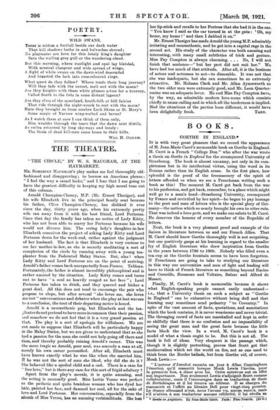THE THEATRE
" THE CIRCLE," BY W. S. MAUGHAM, AT THE HAYMARKET.
Mn. SOMERSET MararrAat's play makes me feel thoroughly old- fashioned and disapproving ; to borrow an American phrase : " I feel the way a camel looks," and I fear that I am going to have the greatest difficulty in keeping my high moral tone out of this column.
Arnold Champion-Cheney, M.P. (Mr. Ernest Thesiger), and
his wife Elizabeth live in the principal family seat because his father, Clive Champion-Cheney, has disliked it ever since the day, thirty years ago, when his extremely pretty wife ran away from it with his best friend, Lord Porteous. Since that day the family has taken no notice of Lady Kitty, who has not been able to marry her Porteous because his wife would not divorce him. The erring lady's daughter-in-law Elizabeth conceives the project of asking Lady Kitty and Lord Porteous down for the week-end, rather against the judgment of her husband. The fact is that Elizabeth is very curious to see her mother-in-law, as she is secretly meditating a sort of completion of the circle by running away with- a young tea- planter from the Federated Malay States. But, alas ! when Lady Kitty and Lord Porteous are on the point of arriving, Arnold's father comes back unexpectedly from France. Tableau. Fortunately, the father is almost incredibly philosophical and is rather amused by the situation. Lady Kitty comes and turns out to have " a soul as heavily rouged as her face " ; Lord Porteous has taken to drink, and they quarrel and bicker a great deal. All this does not tend to encourage the pair who propose to elope, but after several " she loves me, she loves me not " conversations and debates when the play at last wavers to a conclusion, the toot of their departing motor is heard.
Arnold is a neurasthenic prig, but Elizabeth and the tea- planter do not pretend to have more in common than their passion, and somehow we do not feel that it is a very grand passion at that. The play is a sort of apologia for wilfulness. We are not made to suppose that Elizabeth will be particularly happy in the Malay States, but we are given to understand that as she had a passion for the man she could not help going off there and then, and thereby probably ruining Arnold's career. This was the more tragic as Arnold, poor soul, was scarcely a man at all, merely his own career personified. After all, Elizabeth must have known exactly what he was like when she married him. II he was not the sort of man she liked, why did she do it ? She behaved like a spoiled child and a cad. There is a case for " free love," but is there any case for this sort of frigid adultery ?
Apart from the play's morals, it is quite amusing, and the acting is unusually good. Miss Lottie Venne was perfect as the pathetic and quite brainless woman who has dyed her hair, painted her face, and damned her soul, all for the sake of love and Lord Porteous. Her conversation, especially from the nionth of Miss Venne, has an amusing verisimilitude. She lost her lip-stick and recalls to her Portents that she had it in the oar. " You know I said as the car turned in at the gate : Oh, my home, my home ! ' and then I dabbed it on."
Mr. Ernest Thesiger has made Arnold the young M.P. admirably irritating and neurasthenic, and he got into a capital rage in the second act. His study of the character was both amusing and interesting, with many small subtleties of trick and gesture. Miss Fay Compton is always charming. . . . No, I will not finish that sentence—" but her part did not suit her." We have had too much of that attitude. After all, it is the business of actors and actresses to act—to dissemble. It was not that she was inadequate, but she can sometimes be so extremely attractive. Mr. Holman Clark and Mr. Allan Aynesworth as the two older men were extremely good, and Mr. Leon Quarter- maine was an adequate lover. He and Miss Fay Compton have, by the way, an admirable modern love-scene which consists chiefly in name-calling and in which all the tenderness is implied. Had the situations of the parties been different, it would have


































 Previous page
Previous page